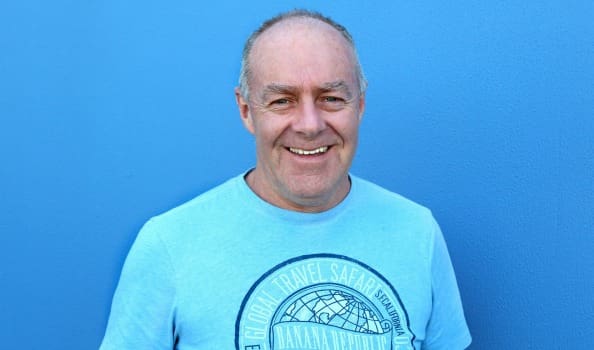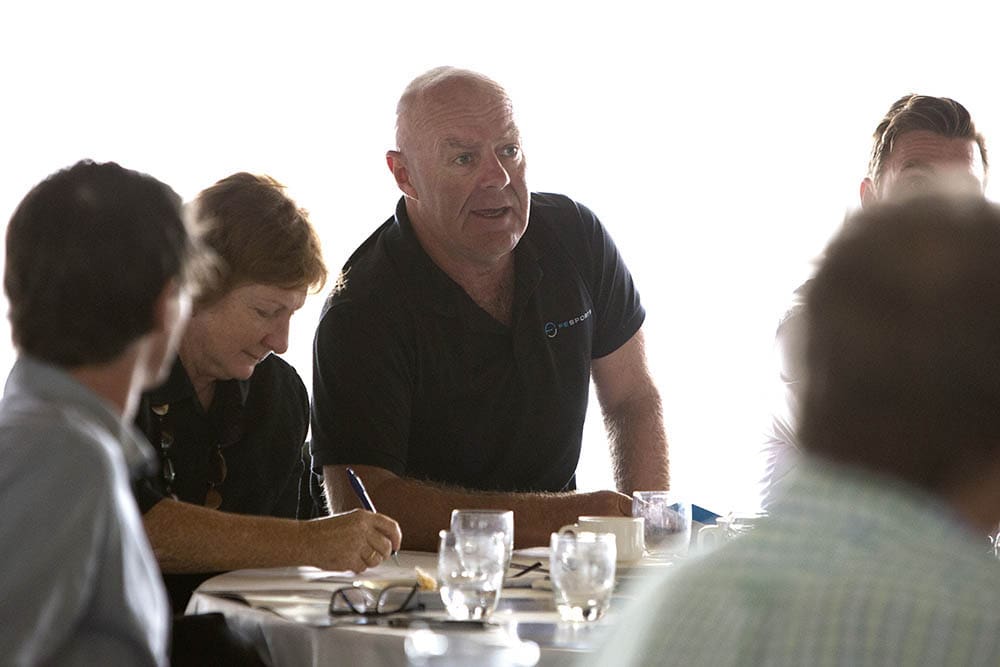Dave Mohr’s Priorities as BIA’s New Board Chairman

Bicycle Industries Australia is the Australian bicycle industry’s peak representative body, with most of the major wholesalers and a smaller proportion of retailers being members.
BIA recently voted for Queenslander Dave Mohr to be its new Chairman*, so we decided to find out more about Dave’s background and his aspirations for our industry.
We started by asking Dave to detail his bike industry background.
“I started in the bike industry about 18 years ago with Chris Langdon whose business was then called Zipp Australia,” Dave replied. “I came in to help him on his business with a diverse business experience and tertiary qualifications, to back it up, on his business which was small at that time.
“I became National Sales Manager after about six months and I was there for about five or six years. We had a great relationship, grew the business dramatically and we’re still friends to this day.
“After that I went to a new start up called Specialized Australia… (laughs). I had about five years there.
“From there I went to FE Sports. At the time, over 90% of its business was Garmin, but the owner, Branko Brkic, was smart enough to know to not have all your eggs in one basket.
Part of my job was to make us more broadly ‘bike industry’ than just ‘bike electronics’ so we added many new brands and product lines.
“I left FE Sports full time about three years ago. I still work with them part time but also consult for other wholesale distributors.”
Of course, many other people have worked in the bike industry for just as long, or in some cases much longer than has Dave, and they’re not necessarily interested in spending time working on bigger picture, industry wide issues. So next we asked Dave what his motivation was for getting more deeply involved.
“I’m interested, because I see the bicycle industry as effectively being where the motorcycle industry was about 10 years ago,” Dave said. “I’ve always felt that we were a bit behind. We used to be 15 years behind, but I think we’re catching up.
“Back in the day when I raced motorcycles, motorcycle shops were black holes! Now look at them… they look like car dealerships.
“The same thing is finally happening with bicycle dealers. Retailers that are small black holes in the corner with wheels hanging from the ceiling everywhere are a dying thing.
“People want a shopping experience. If they don’t want an experience, then they’ll buy online. But they need and want an experience, don’t they? They want to talk to the guy who knows all about a product.
“For example, if they’re going into the dealer for a computer mount, they want the guy in the shop to know the product, the range, the colours and that they have it in stock.
“Gone are the days of, ‘I’ll get it in for you.’ We’re a McDonalds generation. We want everything now!
“To do that retailers have to stock things, but they can’t stock a little bit of this and a little bit of that. They must carry all of a range, or at least a high proportion.
“For example, if you’re going to be a Zipp wheel dealer, you actually have to carry wheels in stock. Nowadays people have done their homework online. They know what they want, they know the retail price because they can buy direct, but they want to deal with their local shop to see and touch and buy. If the shop hasn’t got them, they’ll go to the next nearest Zipp wheel dealer.
“You don’t go to the Toyota dealer and they haven’t got a Camry. They might not have the exact colour you want, but if there are say, three model levels, they’ll at least have a sample of each one that you can sit in, touch it, feel it and test drive. That’s what needs to happen in bike shops.”

Dave has already spent several years as a BIA board member before putting his hand up for the role of Chairman. So what would he like to see happen during his time in the top job?
“The really clear message is BIA is not about getting people on bikes. That’s not our job, that’s We Ride Australia and that’s why the two organisations were separated,” he explained.
“BIA is about making it easy for wholesalers and retailers to do business.
“If there are a plethora of laws that stop business happening, it makes it harder. Everybody wants it to be easier. So I see BIA fighting for laws, for example uniform helmet standards.
“People complain about us having to comply with Australian Standards for helmet laws. But this is one area where the bike industry has done better than the motorcycle industry, that hasn’t done a good job. You can now buy motorcycle helmets in Queensland that are legal but you can’t legally use in NSW, because they don’t have common laws across the states, because their equivalent of BIA didn’t do their job.
“We’re very lucky that we’ve got a guy who isn’t asleep behind the wheel, being Peter Bourke (BIA Executive Officer), but we need to drive that.
“For example, there was talk of a whole new standard for headlights and tail lights. If Peter hadn’t been on the ball, every wholesaler in the country would have had lights that were non-compliant. But Peter was able to fix that because we speak to Government as the industry peak body.”
Another key goal for Dave is a complete and proactive membership.
“Every wholesaler should be a member,” he stated. “That’s the bottom line. It’s not expensive. Things like standards and tech advice, they’re the cornerstones of BIA.
Peter gets over 500 information requests a year. So anybody who wonders what they do…
“And then wholesalers need to not just join, but buy into the program, for example by taking part in data collection. Because currently, we’re dealing with government as the peak body, yet we don’t have all the information that we could have.
“85% of the e bike importers now contribute their numbers, so we now know how many e-bikes are being sold. But there’s a couple of dissidents who don’t take part. Why wouldn’t they do it?
“The information is handled by an outside company. Only the raw data is used. No brand details are shared. It’s not about competing against each other. It’s a numbers game and right now we don’t have the numbers game covered like cars and motorcycles have because we don’t have registration data.
“But even where there are not registrations required, say with dirt bikes, the motorcycle companies still report their data.
“We’re the only industry that don’t do it. Boating and fishing do it, motorcycles, cars… to get more leverage, we need more data.
“I see that our space is changing drastically and we’ll be seeing more collaboration from competitors in all of our sectors.
“For example, in cars the latest BMW Z4 soft top roadster, is a collaboration between BMW and Toyota., so you can buy the same car as a Toyota Supra. Because worldwide sales of soft top car sales are relatively low, each company can’t afford to do it on their own, so they do collaborations.
“Looking at bicycles. Road bike sales are declining to flat, yet MTB has gone through the roof and gravel is on a slow increase, but it hasn’t boomed like MTB first did years ago. But across all three segments it’s discretionary spending and it’s for people’s personal adventure.
“A friend of mine runs the biggest jet ski dealership in the world. He can’t get enough of them. They’re also a big boat dealer, but boat sales are nosediving.
“The same in motorcycles, adventure bikes are the strongest growth category.
“So we’re seen the same trend across all of these categories. Customers are looking for personal adventure.”
Dave would like to see comprehensive data collected across all bicycle sectors and thinks that the growingly successful e bike data collaboration is an important first step.
“I think we have to start by getting every e bike importer on board and everyone seeing that no confidential data about individual company sales leaks,” he explained.
“Then when they see the benefits, we will be able to successfully do it on non-power assist bikes.
“In the long term, the numbers will help everybody. If we all know the total sales of each bike category, then every company, knowing their own share of each market category, can forecast more accurately for the following year, so that there’s no redundancy. At the end of season or model run, you don’t have this redundancy (overstock) problem.
“Also from a product support point of view. If the Bosch, Shimano and other service providers know the data, then they know how many warranty parts to import, how much servicing and service training to prepare for.
“All of this in the long run makes product cheaper and more accessible.”
Another priority for Dave is progressing the internationally recognised mechanics’ training program Cytech.
“I think the mechanics’ course is critical,” he said.
“The sooner that we end up with a standardised mechanics’ qualification, repair standards will go up. The ability to charge more at a retail level will go up and liability claims will go down, so insurance premiums will go down over time.
“If you go to the Toyota dealer, they don’t let a bloke of the street do the service. They’re factory trained, they’re accredited, they’re insured. It also drives the job time down.
“Right now people look at their bicycle service at $150 or $200 and think it’s high, but they put their car in for a service and it’s $600, $900 or more depending upon the car, and they justify it. Trained mechanics, fully insured, full warranty.
Cytech’s bicycle mechanics’ training levels are called Level 1, 2 and 3. Then when a customer comes in with a more difficult repair the shop can charge more because they can say, ‘We’re going to put our level 3 mechanic on your bike.’
It’s a win for everybody.
“I think we have to do something because otherwise insurance companies are going to force it upon us.
“BIA does not need to spread our focus, we need to concentrate it. There’s no point in trying to do lots of things and not doing anything well.
BIA has a great, diverse board now who bring different perspectives. That’s what our whole industry needs.”
*Note regarding the use of the word ‘Chairman’: Contrary to popular belief, the word chairman is gender neutral because it refers to the ‘manager of the chair’. Therefore, the word ‘chairperson’ may seem to be politically correct, but is grammatically misleading.

Good luck Dave!! all sounds positive.